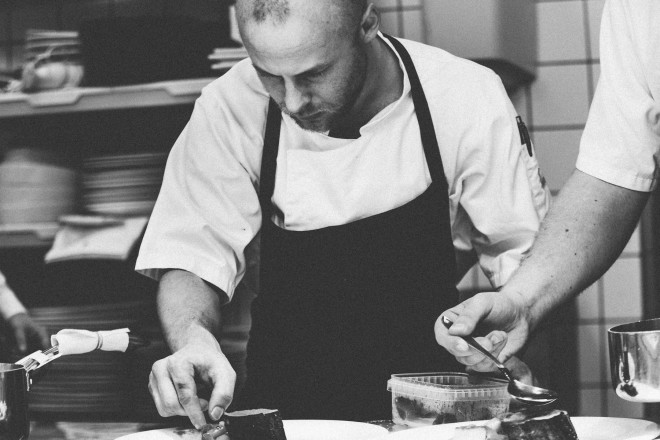How To Help Your Chef Achieve A Better Work-Life Balance

Let your chef know you value his work, and his job is secure.
Nearly one in three adults say the work-life balance is getting harder to achieve, and it’s become progressively harder in the last five years.
This has led many businesses to put their focus on helping employees achieve that balance.
While telecommuting and working from home have become options in other industries, those options are typically unavailable to restaurant industry workers.
In fact, the restaurant industry has the reputation for a competitive, win at all costs atmosphere. All you have to do is turn on the TV to see culinary battles take place daily.
This is why, in this article, we’re going to look at how to help your chef achieve a better work-life balance. First, let’s look at why this can be difficult for restaurant workers.
The Competitive Realm
From the beginning of a young chef’s career, they understood that to be successful they needed to put in as much time as possible in the kitchen.
Taking a day off wasn’t an option up for consideration.
The chef is responsible for the rhythm in the kitchen. If he or she isn’t there, the flow can be interrupted, so the chef feels compelled to work seven days a week.
Leading the helm of a respected kitchen is a high-pressured situation for most chefs. Consider the string of high-profile deaths early in 2016.
- Michelin-starred Swiss chef, Benoît Violier, shot himself right after his restaurant was designated the best restaurant in the world in La Liste, France’s ranking of 1,000 restaurants in 48 countries, which is a huge honor. Did he fall prey to the high-pressure restaurant world?
- In the United States, Homaro Cantu, the chef at Moto, another Michelin-starred restaurant hanged himself. People wondered if the demands of a celebrity chef were just too much.
Mental health experts agree that the competitive, creative world can be filled with stress and anxiety where talking about problems can be taboo.
Strong pressure exists for chefs to create and maintain excellence and create food worthy of the arts.
Achieving a work-life balance can be beneficial to help your restaurant avoid burnout and tragedy. Let’s look at how to help your chef achieve that balance.
Teach Delegation Skills
Your chef may suffer from the need to control the kitchen and everything that comes in and goes out of it.
Encourage him to delegate some of his tasks. If this seems like too much for your chef, provide some outside training so he has the tools to actually do the delegating.
Along with helping your chef hone his delegation skills, comes instilling faith in your chef. (tweet this)
If you value him and his work, tell him. Make him understand that he can delegate while knowing his job is secure. Many times people don’t delegate because they fear they’ll lose their job if someone else knows how to do it or does it better.
The pressure of the job is enough. Let your chef know it’s secure.
Plan Around Split Shifts
Sometimes split shifts are unavoidable, and it’s often hard to arrange to do anything if the time between them is short.
Do what you can to make sure your chef has several hours off in-between a split shift. (tweet this)
Encourage your chef to use this time to exercise, enjoy the fresh air, spend time with family and relax.

Your chef if pivotal to the success of your business.
Days Off in a Row
Employees in 9-5 jobs get two days in row off to refresh their minds and their bodies. This is often hard to do in the restaurant sector, but it is a terrific way to help your chef have a better work-life balance.
Any two days in a row will work. You can make the five-day work week attainable for your chef.
Check in with your employee, too. He might have an idea what days would work best for him so he could spend much needed downtime with family.
Other options when it comes to days off are closing your restaurant for specified times during the year. For example, if you’re extra-busy during the holidays, consider giving your chef and your staff the first week off in January. You could also do this at another slow time during the year.
Your customers won’t mind as they get used to your employee vacation time-frames.
Celebrate Holidays
Odds are your chef is working on Thanksgiving, Christmas, New Year’s, Valentine’s Day and all the other major holidays.
That’s fine and to be expected. But, it’s up to you make sure your chef feels the holiday. Each major holiday comes with its feeling of good will and celebration. For people working on this day, they miss out on the benefits for their minds and bodies.
Encourage your chef to take a day off either before or after the holiday to celebrate it with friends and family. This lets your chef enjoy the good feelings that come from celebrating the holidays.
Enforce Vacation Time
While that may sound harsh, vacation time is vital to your chef’s energy and creativity levels.
One study shows that American workers only use 51% of their paid vacation time.
In the high pressure world your chef lives in, it can be hard to walk away and take vacation. He may worry about losing his job to an underling, or he may worry that the food won’t be prepared correctly.
Help allay your chef’s worries and insist he use all of his vacation time for his health.
To Conclude
You’ll find that many areas of the workforce are shifting their goals and working towards enhancing a work-life balance. In fact, employees in the 21st century are demanding it.
Yet, many in the restaurant industry aren’t following suit. We invite you to be the change.
Your chef is one of your best employees. The chef’s job is pivotal to your restaurant’s success.
So, enhance your working environment and the underlying philosophies of time worked.
Understand that your chef needs downtime to de-stress and recharge so he or she can come back to work fresh and rested.
Work-life balance is a necessary fact. The consequences of an overworked employee are harmful to your restaurant. After all, you don’t want to see a chef who is suffering from burnout, resentment and dissatisfaction.
These characteristics lead to a bad work environment and high turnover.
Address the needs of your chef. Find out how to relieve the stress and pressure of the job, and once you’ve done that, you can start working on the work-life balance of the rest of your staff.
You’ll find that a healthy work-life balance for your chef and your other employees leads to a content workforce dedicated to seeing your restaurant succeed.
Have you instituted any policies at your restaurant to enhance work-life balance? Has it worked out? We’d love to hear about your experiences. Please share below.
Images: Clem Onojeghuo and Nick Karvounis

Leave a Reply